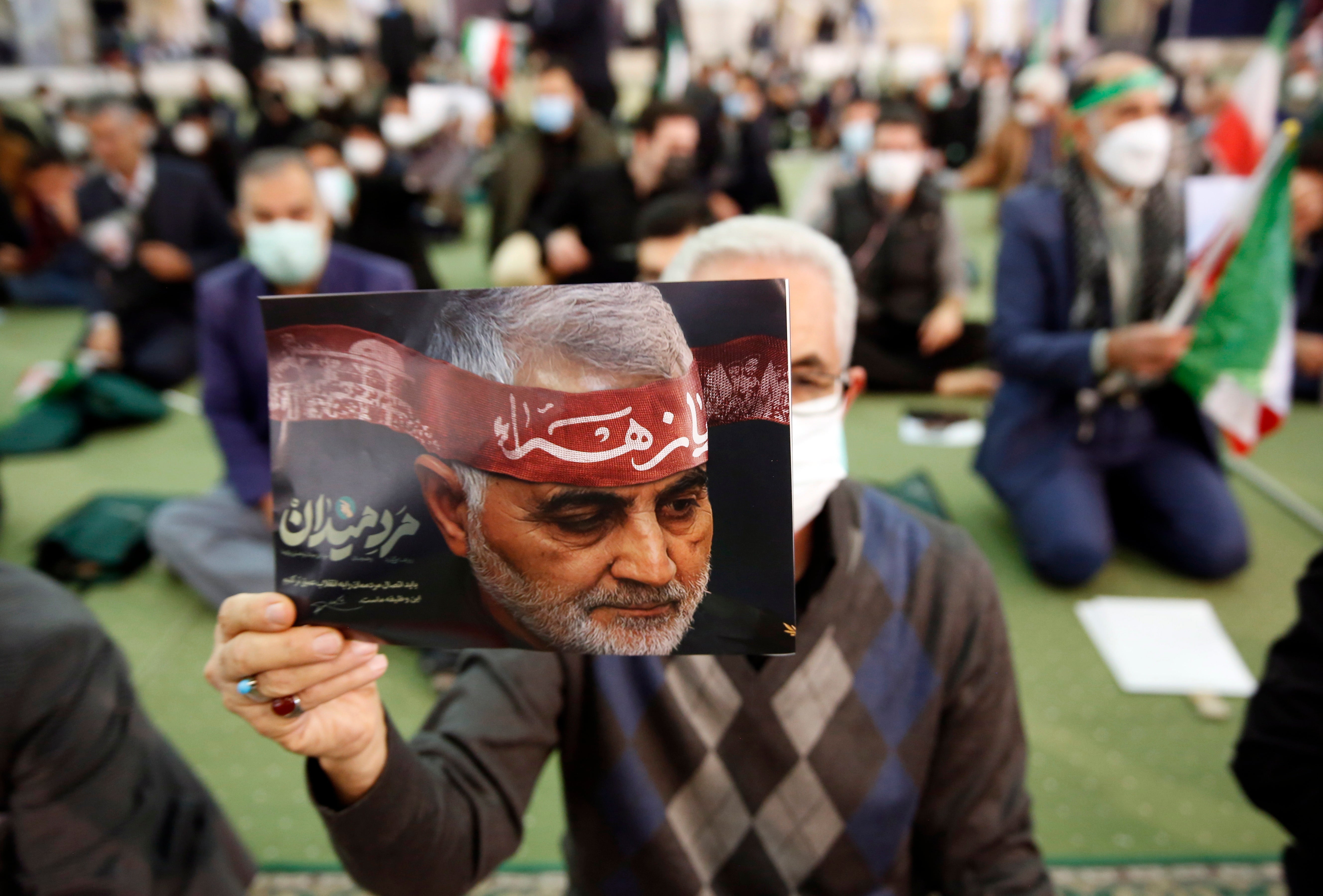Iran-backed Houthis seize UAE ship on anniversary of Soleimani assassination
Incident is possibly ominous note of troubles that could brew in the Middle East in 2022

Your support helps us to tell the story
From reproductive rights to climate change to Big Tech, The Independent is on the ground when the story is developing. Whether it's investigating the financials of Elon Musk's pro-Trump PAC or producing our latest documentary, 'The A Word', which shines a light on the American women fighting for reproductive rights, we know how important it is to parse out the facts from the messaging.
At such a critical moment in US history, we need reporters on the ground. Your donation allows us to keep sending journalists to speak to both sides of the story.
The Independent is trusted by Americans across the entire political spectrum. And unlike many other quality news outlets, we choose not to lock Americans out of our reporting and analysis with paywalls. We believe quality journalism should be available to everyone, paid for by those who can afford it.
Your support makes all the difference.The Iranian-allied militia and political network controlling northern Yemen has seized a cargo ship tied to the United Arab Emirates, intensifying strains between rival camps in the Middle East.
The seizure coincided with the two-year anniversary of the American killing of Iranian Quds Force commander Qasem Soleimani.
A Saudi military spokesman said the UAE-flagged Rwabee was carrying medical equipment from Yemen’s Socotra Island to the Saudi port of Jizan when it was attacked by armed men before dawn on Monday and seized by Ansarullah, commonly known as the Houthi militia.
The Houthis confirmed they captured the Rwabee, describing it as a military cargo ship carrying military equipment in Yemeni waters without permission.
The incident provided an early and possibly ominous note of the disruptive troubles that could brew between allies and opponents of Iran in the Middle East in 2022.
“The terrorist Houthi militia will bear full responsibility as a result of its criminal act of piracy against the ship,” Saudi Brig. Gen. Turki al-Maliki, spokesman for Riyadh’s armed intervention in Yemen, was quoted as saying by the official Saudi Press Agency. He warned that Saudis would “undertake all necessary measures and procedures to handle this violation, including the use of force if necessary”.
Houthi officials said they would disclose the contents of the captured ship in the coming hours.
“The successful and unprecedented operation comes as part of confronting the aggression and the siege,” Mohammad Abdulsalam was quoted as saying by al-Masirah, a pro-Houthi news outlet.
In recent months there have been efforts to resurrect diplomacy that have included Iraqi-brokered meetings between Saudi and Iranian officials and official visits between senior Emirati and Tehran envoys. But the incident at sea highlighted the perceived dangers of military confrontation between Iran and its rivals.
Soleimani’s assassination in a United States drone strike prompted Tehran to launch a barrage of missiles at an American base in western Iraq and to accidentally shoot down a Ukrainian passenger plane.
Soleimani, former commander of the Iranian Revolutionary Guard’s overseas operations, helped build up and bolster a vast network of pro-Iranian armed groups, including the Houthis. He was heralded in Iran on Monday as a martyr, with parades and commemorations around the country.
“Soleimani is a symbol of hope, self-confidence and bravery and a manifestation of resistance and victory,” Iran’s Supreme Leader Ali Khamenei said in a speech on Saturday. “‘Martyr’ Soleimani is more dangerous than ‘General’ Soleimani.”
On Monday, Iran’s President Ebrahim Raisi vowed revenge for the assassination of the Iranian general unless former US President Donald Trump was put on trial.
“If Trump and (former Secretary of State Mike) Pompeo are not tried in a fair court for the criminal act of assassinating General Soleimani, Muslims will take our martyr’s revenge,” Raisi said in a televised speech.
Pro-Iranian hackers also defaced the website of Israel’s Jerusalem Post, displaying an image of a missile being fired at the Dimona research facility that is the centrepiece of the country’s undeclared nuclear weapons programme. It was the latest in a series of tit-for-tat cyber attacks between hackers allied with Iran and Israel. “We are close to you where you do not think about it,” said the text in English and Hebrew.
Iran’s foreign minister Hossein Amir-Abdollahian said Soleimani’s international network of armed groups strengthened Tehran’s hand in talks with the west over its nuclear programme.
“What happened in the region and its results – peace and security in the regional countries, particularly in Iraq and Syria – formed the background for us at the international negotiations table,” he told state television.
Yemen has emerged as another theatre in the confrontation between Iran and its adversaries, though the extent of Tehran’s control over the Houthis remains in doubt. The country has been at war for more than seven years. Houthis, backed both by Iran and the powerful Lebanese organisation Hezbollah, are fighting a western-backed coalition led by Saudi Arabia seeking to empower the UN-recognised government in what has been described as one of the world’s worst man-made humanitarian disasters.
Monday’s incident took place near Yemen’s Bab al-Mandab Strait, which connects the Suez Canal and Red Sea to the Gulf of Aden and the Indian Ocean beyond. Nearly 10 per cent of the world’s oil passes through the choke point, and the price of petroleum rallied on Monday to near $79 (£58) a barrel, increasing inflationary pressures on the global economy.
The incident off the Yemeni coast came days after the Saudi-led coalition launched a botched airstrike that killed at least 15 people who were allegedly its own allies.



Join our commenting forum
Join thought-provoking conversations, follow other Independent readers and see their replies
Comments